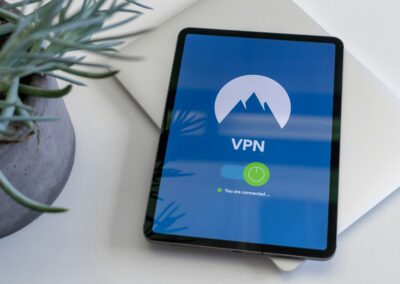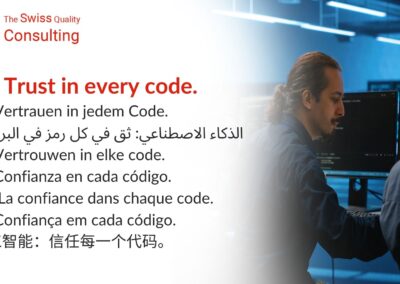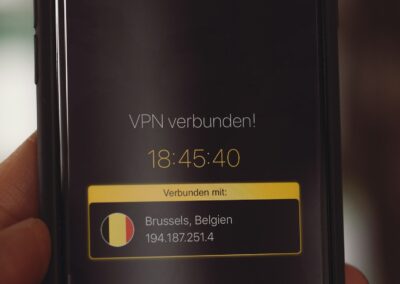Understanding the Zero Trust Security Model
What is the Zero Trust Security Model?
In today’s digital landscape, the Zero Trust Security Model has become a cornerstone of effective cybersecurity strategies. Particularly in regions like Saudi Arabia and the UAE, where rapid technological advancements are fueling economic growth, the need for robust security measures is paramount. The Zero Trust model operates on the principle that threats can originate both inside and outside the network, necessitating stringent verification for every user and device attempting to access network resources. Unlike traditional security models that assume everything within the network is trustworthy, Zero Trust assumes nothing and verifies everything, thereby significantly enhancing security.
Key Principles of Zero Trust
The Zero Trust Security Model is built on several key principles designed to ensure comprehensive protection. These include strict identity verification, least privilege access, and continuous monitoring. In Riyadh and Dubai, businesses are adopting these principles to safeguard their data and infrastructure. Identity verification involves confirming the identity of every user and device before granting access, minimizing the risk of unauthorized access. Least privilege access restricts users to only the resources they need to perform their duties, reducing the potential damage from compromised accounts. Continuous monitoring ensures that any unusual activity is detected and addressed promptly, maintaining the integrity of the network.
Implementing Zero Trust in Modern Business Environments
Implementing the Zero Trust Security Model requires a strategic approach and advanced technological tools. Businesses in Saudi Arabia and the UAE are leveraging modern technologies such as Artificial Intelligence (AI) and Blockchain to enhance their Zero Trust frameworks. AI can analyze vast amounts of data to identify patterns and detect anomalies, providing real-time threat detection and response. Blockchain technology offers a secure and transparent way to manage access control and transaction records, ensuring that all activities within the network are traceable and verifiable. By integrating these technologies, companies can build a robust Zero Trust architecture that protects their critical assets.
Benefits of the Zero Trust Security Model
Enhanced Protection Against Cyber Threats
One of the primary benefits of the Zero Trust Security Model is its ability to provide enhanced protection against cyber threats. In dynamic business environments like Riyadh and Dubai, where digital transformation is rapidly advancing, cyber threats are becoming increasingly sophisticated. Zero Trust mitigates these threats by ensuring that every access request is thoroughly vetted and that no implicit trust is granted. This proactive approach significantly reduces the risk of data breaches and cyber attacks, safeguarding business operations and maintaining customer trust.
Facilitating Compliance with Regulatory Standards
Compliance with regulatory standards is a critical concern for businesses operating in Saudi Arabia and the UAE. The Zero Trust Security Model helps companies meet these requirements by implementing stringent access controls and continuous monitoring. Regulatory standards often mandate the protection of sensitive data and the ability to trace and audit access to this data. Zero Trust provides the framework for meeting these requirements by ensuring that all access is authenticated and authorized, and that comprehensive logs are maintained for auditing purposes. This not only helps businesses avoid regulatory penalties but also enhances their reputation for security and compliance.
Supporting Remote Work and Digital Transformation
The rise of remote work and digital transformation has highlighted the need for flexible and secure access solutions. The Zero Trust Security Model is particularly well-suited to support these initiatives. In regions like Riyadh and Dubai, where businesses are embracing remote work and digital innovation, Zero Trust ensures that employees can securely access company resources from anywhere. By verifying every access request and continuously monitoring activity, businesses can maintain security without compromising on flexibility and convenience. This enables companies to adapt to changing work environments while keeping their networks secure.
Implementing Zero Trust for Business Success
Leadership and Management in a Zero Trust Environment
Driving Change with Effective Leadership
Implementing a Zero Trust Security Model requires strong leadership and change management skills. Leaders in Saudi Arabia and the UAE must champion the adoption of Zero Trust principles and ensure that their teams are equipped to handle the transition. This involves providing training and resources to help employees understand the importance of Zero Trust and how it impacts their roles. Effective leadership is crucial for driving cultural change within the organization and fostering a security-first mindset. By promoting a culture of security, leaders can ensure that Zero Trust principles are integrated into every aspect of the business.
Developing Comprehensive Security Policies
A successful Zero Trust implementation requires the development of comprehensive security policies that outline the rules and procedures for access control and monitoring. In Riyadh and Dubai, businesses are creating detailed policies that specify the requirements for identity verification, access management, and incident response. These policies must be regularly reviewed and updated to address emerging threats and changing business needs. By establishing clear and enforceable policies, companies can create a structured framework for Zero Trust that ensures consistency and effectiveness across the organization.
Investing in Advanced Security Technologies
To fully realize the benefits of the Zero Trust Security Model, businesses must invest in advanced security technologies that support its principles. This includes deploying tools for multi-factor authentication, endpoint security, and continuous monitoring. In Saudi Arabia and the UAE, companies are leveraging AI-driven security solutions that provide real-time threat detection and automated response capabilities. Additionally, blockchain technology is being used to create immutable records of access and transactions, enhancing transparency and accountability. By investing in these technologies, businesses can build a resilient Zero Trust architecture that adapts to evolving security challenges.
Project Management in a Zero Trust Framework
Ensuring Secure Collaboration
Project management in a Zero Trust framework involves ensuring that all collaborative efforts are conducted securely. In regions like Riyadh and Dubai, where complex projects often involve multiple stakeholders, maintaining security throughout the project lifecycle is critical. Zero Trust principles can be applied to project management by verifying the identity of all participants, restricting access to sensitive information, and continuously monitoring project activities. This ensures that all collaborative efforts are protected from unauthorized access and potential cyber threats, enabling projects to proceed smoothly and securely.
Optimizing Resource Allocation
Effective resource allocation is essential for successful project management. The Zero Trust Security Model helps project managers optimize resources by providing detailed insights into access patterns and potential risks. In Saudi Arabia and the UAE, businesses are using these insights to allocate resources more efficiently and prioritize security measures where they are most needed. By leveraging Zero Trust principles, project managers can ensure that resources are used effectively to mitigate risks and achieve project goals. This not only enhances project outcomes but also contributes to overall business success.
Maintaining Compliance and Accountability
Maintaining compliance with regulatory standards and ensuring accountability are critical aspects of project management. The Zero Trust Security Model supports these objectives by providing a robust framework for access control and auditing. In Riyadh and Dubai, businesses are implementing Zero Trust to ensure that all project activities comply with relevant regulations and that accountability is maintained throughout the project lifecycle. This involves creating detailed logs of all access and transactions, which can be audited to verify compliance. By maintaining compliance and accountability, businesses can build trust with stakeholders and achieve long-term success.
Conclusion: Embracing Zero Trust for Future Success
Adapting to the Evolving Threat Landscape
The digital landscape is constantly evolving, with new threats emerging regularly. The Zero Trust Security Model provides a proactive approach to cybersecurity that helps businesses stay ahead of these threats. In Saudi Arabia and the UAE, where technological innovation is driving economic growth, adopting Zero Trust is essential for protecting critical assets and ensuring business continuity. By continuously verifying access and monitoring activity, businesses can detect and respond to threats more effectively, minimizing the risk of breaches and ensuring a secure digital environment.
Building a Resilient and Secure Business
Resilience is a key attribute for businesses aiming to succeed in the modern digital world. The Zero Trust Security Model enhances resilience by providing a robust framework for security that can adapt to changing threats and business needs. In regions like Riyadh and Dubai, where businesses face a dynamic and competitive landscape, Zero Trust ensures that they can maintain security without compromising on flexibility and innovation. By building a resilient and secure business, companies can achieve sustainable growth and long-term success.
Fostering Innovation with Confidence
Innovation is crucial for business success, but it must be pursued with confidence in security. The Zero Trust Security Model enables businesses to innovate while maintaining a high level of security. In Saudi Arabia and the UAE, where innovation is a key driver of economic growth, Zero Trust provides the assurance that new technologies and business models can be adopted securely. By fostering a culture of innovation with confidence, businesses can explore new opportunities and drive growth without exposing themselves to unnecessary risks.
Embracing the Zero Trust Security Model is essential for businesses in Saudi Arabia and the UAE aiming to succeed in the digital age. By integrating Zero Trust principles into their security strategies, companies can protect their critical assets, ensure compliance, and foster a culture of innovation. With strong leadership, advanced technologies, and comprehensive security policies, businesses can build a secure and resilient future.
—
#ZeroTrustSecurityModel #SaudiArabia #UAE #Riyadh #Dubai #ArtificialIntelligence #Blockchain #Metaverse #GenerativeAI #ModernTechnology #BusinessSuccess #Leadership #ManagementSkills #ProjectManagement
























